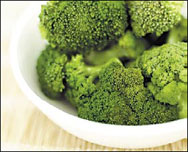IN BRIEF (Page 19)
Painkillers cause headaches
Painkillers are the main cause of chronic headaches, according to a study presented on Thursday.
Dutch neurologist Natalie Wiendels says the vast majority of people who suffer from chronic headaches take too many painkillers.
Wiendels says the government should oblige all pain medication manufacturers to print a warning on the packaging that painkillers cause headaches.
Wiendels defines chronic headaches as pains that occur more than 14 times per month for at least three consecutive months.
Wiendels says most people who take painkillers, eventually become addicted to them. If they stopped taking the medication, their headaches would lessen, Wiendels says.
Feeling tired? Exercise a little
Couch potatoes who complain they are tired all the time have an easy solution - a little light exercise. Regular, low-intensity workouts such as a leisurely stroll can boost energy levels by 20 percent and decrease fatigue by 65 percent, a team at the University of Georgia found.
Vitamin pills don't cut cancer risk
People who take vitamin supplements are just as likely as those who don't to develop lung cancer, and vitamin E supplements may actually slightly raise the risk, researchers said on Friday. Their study involved 77,721 people in Washington state ages 50 to 76, tracking their use over the prior decade of supplemental multivitamins, vitamin C, vitamin E and folate to see if this would offer protection from lung cancer.
Cabbage protects against cancer

A diet high in vegetables like cabbage could protect against bladder cancer, a New Zealand scientist who led a team of researchers into the subject reported on Tuesday.
Agricultural scientist Rex Munday said tests on animals showed that an extract of broccoli sprouts reduced the incidence of bladder cancer by more than 50 percent.
He said researchers from Roswell Park Cancer Institute and Johns Hopkins University, in the United States, had worked on the project with New Zealand's Massey University and Crop and Food Research.
The findings supported an earlier study showing that rats fed with vegetables of the cabbage family, such as broccoli, cauliflower, Brussels sprouts and watercress, showed an increase in tissue enzymes that protect against cancer-causing chemicals.
Why winter is 'flu season'
Influenza viruses coat themselves in fatty material that hardens and protects them in colder temperatures - a finding that could explain why winter is the flu season, US researchers reported on Sunday. This butter-like coating melts in the respiratory tract, allowing the virus to infect cells, the team at the National Institutes of Health found.
Combating teen depression
Teenagers whose initial drug treatment fails to combat depression, which happens in four out of 10 cases, can be helped by switching medicine and adding psychotherapy, according to a US study published last week. "The findings should be encouraging for families with a teen who has been struggling with depression for some time," said Dr David Brent of the University of Pittsburgh who headed the research.
Breast cancer gene research
Among women with BRCA1 gene mutations, which are known to increase the risk of breast cancer, annual screening with both mammography and MRI is associated with better survival when compared with screening with either method alone, new research indicates.
The trade-offs, however, are a high rate of false-positive results, which lead to unnecessary biopsies. The findings were based on data from 22 studies that included 8,139 women who carried the BRCA1 gene. In addition, the researchers developed a prediction model based on data from the Surveillance Epidemiology and End Results (SEER) Program (1975-1980) and the Breast Cancer Surveillance Consortium.
Agencies
(China Daily 03/05/2008 page19)














